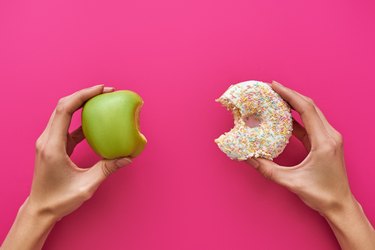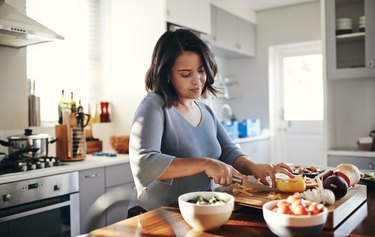
Have you ever eaten an incredible meal and then felt like crap two hours later?
Giving yourself permission to enjoy the foods you love is a critical part of cultivating a healthy relationship with food — but there's also a delicate balance between honoring your cravings and practicing compassion for your body.
Video of the Day
Video of the Day
"Because of the complex body-mind-spirit connection with the foods we eat, it's essential to choose foods that make us feel good not only in the moment but also after we [finish our meal]," says Sylvia Gonsahn-Bollie, MD, a dual board-certified obesity medicine physician and CEO of EmbraceYOU Weight & Wellness.
Think of your diet just like any other form of self-care. Would you do a HIIT workout if you knew it would make your back injury even worse? Hopefully not. The same mentality should apply to our food choices.
If you're often uncomfortable after finishing meals, get curious about what your body is telling you.
Food Allergies vs. Intolerances vs. Sensitivities
Food allergies are mediated by the immune system and reactions occur immediately upon ingestion of any amount of the offending ingredient.
Food intolerances are typically a result of not being able to digest a certain nutrient, like lactose in the case of lactose intolerance.
Food sensitivities, which are not immune responses, typically take longer to present and can be dose-dependent. It's more of an umbrella term that can include symptoms not limited to the GI tract, such as headaches, brain fog or rashes in response to an ingredient or additive one is sensitive to, per Harvard Health Publishing.
What It Means When...
1. You’re Bloated and Gassy
This just in: Sometimes a massive salad isn't the best choice on the menu. Large quantities of raw vegetables can be tough to digest thanks to their high fiber content.
It's also not uncommon for people to react to certain foods that fall under the umbrella of FODMAPs, a subset of carbohydrates that can promote excessive gas production and bloating in sensitive folks.
Common high-FODMAP foods include ingredients most of us consider to be ultra-nourishing, like cruciferous veggies, whole-wheat bread and garlic. "Other common high-FODMAP culprits are dairy products, sweeteners like sorbitol and xylitol and legumes like peanuts," Dr. Gonsahn-Bollie says.
Fix it: While your usual kale Caesar might seem like the best choice for lunch, the order could be exacerbating that 3 p.m. bloat you can't seem to beat. Start by emphasizing cooked vegetables over raw ones to assess whether they sit better with your body.
2. Your Head Hurts
Ever feel like those happy hour drinks and charcuterie boards don't leave you feeling so happy later on?
While it's possible you're just overdoing it on the booze and salt, regularly having headaches after eating or drinking certain things can also indicate a food sensitivity, says Mary Matone, RD, director of operations and senior registered dietitian at Culina Health.
Food sensitivities can sometimes present as headaches, per the Cleveland Clinic. Common culprits of food-fueled headaches include alcohol and chocolate, as well as MSG, tyramine and nitrites, Matone explains.
Fix it: "Unfortunately, the best way to avoid [headaches or] migraines after eating is to determine which foods trigger your reactions and then avoid them to whatever extent possible," Matone says.
Start food journaling to see if there are any patterns between your intake and the onset of headaches. In the meantime, pray it isn't chocolate.
3. You’re Anxious and Jittery
Eighty percent of all U.S. adults take in some form of caffeine daily, per the Centers for Disease Control and Prevention (CDC). The beloved stimulant is found in coffee, tea, chocolate, soda and energy drinks. Depending on the source (think: unsweetened coffee or green tea), caffeine also provides health-promoting antioxidants.
Fix it: If you're usually anxious or jittery after your go-to cold brew, it may be time to reconsider your caffeine habit.
Avoid drinking caffeinated beverages on an empty stomach, as having caffeine on its own can exacerbate anxiety. If that doesn't help, experiment with slowly dialing back your caffeine intake to determine if it helps drive down symptoms of stress.
4. Your Energy Levels Are Tanking
Hear us out: You deserve to enjoy that bowl of pasta when the craving comes on strong. After all, the more we restrict certain foods, the more likely we are to overeat them when they're finally "allowed."
That said, if your favorite meals consist of carbs and carbs alone (think: plain pasta, toast or a bowl of sugary breakfast cereal), you may experience energy crashes after eating. Carbohydrates — especially refined carbohydrates — are quickly digested, meaning they tend to cause spikes and crashes in blood sugar levels.
Fix it: If your energy levels tend to tank after meals, consider adding to your plate. "When we think about eating for stable energy levels, we want to be intentional about the type [and combination] of foods on our plate," Matone says.
"To prepare your plate for stable energy, aim to include protein, fat and fiber in your meal, as these foods are slow-digesting and can keep you going for a few hours."
Instead of swearing off carbs, add a source of lean protein (like shrimp) and fiber (like broccoli) to your favorite pasta, then enjoy your meal without guilt. You might just feel less sluggish and more satisfied an hour later.
5. Your Stomach Is Cramping
Stomach cramps, abdominal pain, diarrhea and GI distress following a delicious meal is never ideal. One of the most common culprits? Dairy. Nearly 70 percent of people struggle to digest lactose, a simple sugar found in dairy, according to the National Institutes of Health (NIH).
"Unlike a milk allergy, lactose intolerance isn't life-threatening," Dr. Gonsahn-Bollie says. "Some studies have shown that people with lactose intolerance do not need to completely avoid dairy."
Fix it: If dairy doesn't sit right with you, experiment to find out how much and which forms work best for your body.
"The lactose content of cheese varies according to type, which often means that some cheeses will be well-tolerated while others won't be," Matone says. "Hard cheeses like parmesan and cheddar are often better tolerated than soft cheeses like cottage cheese or spreadable cheeses."
For people with lactose intolerance who love dairy, navigating food freedom can be challenging if their favorite ingredients leave them in discomfort. You may struggle with the question: Do I restrict dairy altogether or accept the consequences of an ice cream cone?
While having dairy with lactose intolerance isn't risky as it would be with a true dairy allergy, it probably won't leave you feeling like the best version of yourself.
Matone recommends opting for non-dairy alternatives when possible. And for those special occasions when you just can't resist some creamy goodness, "Lactaid pills, which provide the enzyme needed for the proper digestion of lactose, are a reasonable option if you want to eat a dairy product you don't tolerate," Matone says.
6. You're Feeling Guilty
If eating certain foods is usually followed by a wave of shame or guilt, it might be a sign that you don't have the healthiest relationship with your diet. Food guilt typically stems from beliefs about "good" versus "bad" foods.
After all, we're more likely to feel guilty after eating french fries than after eating a piece of fruit. Why? We've been taught that fried food is "bad" for us and therefore we're "bad" if we eat it.
While fun foods like fries should never make up the majority of your diet, you should be able to enjoy them every now and then without experiencing shame. Because sometimes the anxiety and fear we feel towards food can be even less healthy than the food itself.
Fix it: If you're feeling anxious or guilty after meals, consider working with a registered dietitian (and possibly a therapist) to determine what's driving your food fears. The goal is to enjoy your favorite foods in moderation so you're left feeling satiated instead of ashamed.
How to Identify These Trigger Foods
"Food and symptom journaling is a great way to identify how meals are making you feel," says Matone.
"While you can trial elimination diets, food journals can be helpful for tracking patterns over time."
Start using a food journal to take note of how you feel after eating meals and snacks. Dr. Gonsahn-Bollie encourages us to think beyond the basics: For people trying to better understand how their food affects their body, mind and spirit, she recommends writing down:
- Stress levels
- Any significant events
- Cravings
- How foods make you feel 30 minutes, 1 hour and 3 hours after eating them
"The goal of this practice is not weight loss, but a better understanding of whether your food choices are helping or hurting you," Dr. Gonsahn-Bollie says.
It's crucial to ensure that food journaling isn't triggering any disordered eating behaviors or a focus on calorie counting, Dr. Gonsahn-Bollie says. "If people start to focus more on the macros than the meaning behind the journaling, it may be time to give the behavior a break."
The Bottom Line
Food is the most essential way in which we nourish ourselves.
It's just as important to find joy in food as it is to make choices that feel good for our body not only in the moment but also hours later.
And remember: Food as a form of self-care will look different depending on the scenario. "On some days, this means eating a delicious meal with friends… while on other days this means giving ourselves the veggies we're craving," Dr. Gonsahn-Bollie says.
If you're struggling to strike a balance between eating for joy and for health, work with a registered dietitian to find the best approach for you.
Was this article helpful?
150 Characters Max
0/150
Thank you for sharing!
Thank you for your feedback!


